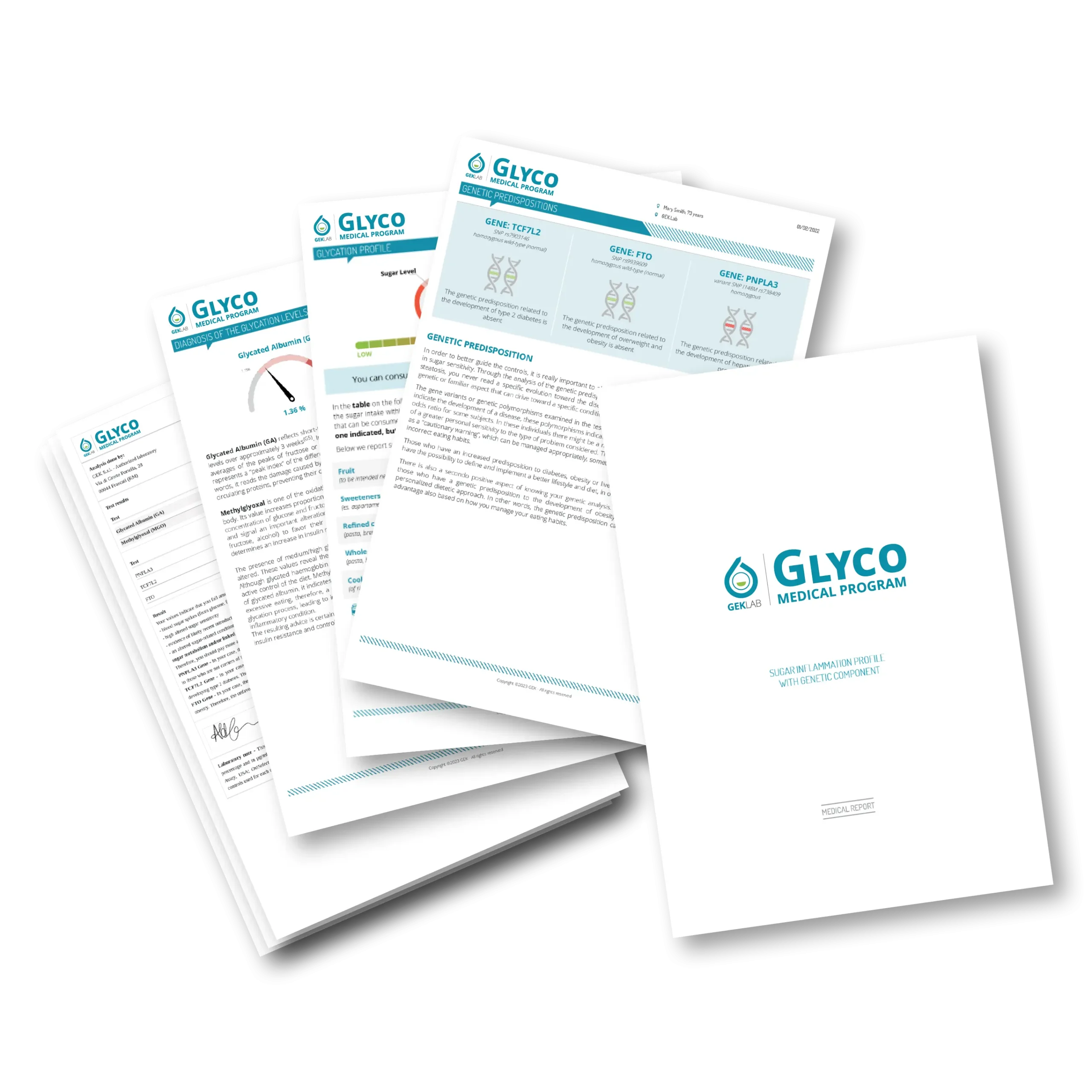
The increasing incidence of diabetes and sugar-related diseases underscores the importance of early diagnosis and treatment of sugar-induced inflammation and pre-diabetic conditions. Preventing diabetes by identifying genetic predispositions and lifestyle factors can significantly add years of healthy life. A personalized medicine approach is essential to improve quality of life and well-being, allowing occasional indulgences without compromising health.
In clinical practice, it has been observed that many elite athletes or highly active individuals have altered glycation profiles, often linked to excessive use of energy drinks or products containing fructose and polyols. A personalized diet aimed at controlling this form of sugar-related inflammation and related substances can improve athletic performance and overall health.
The incidence of food allergies is increasing, with multiple factors contributing to inflammation and allergic reactions. The presence of advanced glycation products, for example, determined by poor dietary habits and excessive intake of sugars (including hidden sugars and related substances), has been identified as a highly significant potential cause in the rise of allergies (as highlighted, for example, by a comprehensive study published in JACI in February 2017).
The incidence of food allergies is on the rise, with multiple factors contributing to inflammation and allergic reactions. The presence of advanced glycation end-products (AGEs), for instance, is determined by poor dietary habits and excess sugar consumption.
Measurement of glycation biomarkers is crucial for early detection of damage in the body, such as insulin resistance or possible gestational diabetes. The accumulation of glycating substances like methylglyoxal has also been correlated with the severity of COVID-19 symptoms.
Glycation markers: glycated albumin and methylglyoxal
Excessive sugar intake can lead to inflammatory and metabolic issues, but how can we highlight and quantify these damages? The measurement of two innovative biomarkers, Glycated Albumin (GA) and Methylglyoxal (MGO), provides an answer. Traditional methods like fasting blood glucose and glycated hemoglobin, which intercept sugar-related damages and prediabetes, are insufficient to predict the progression to type 2 diabetes, as highlighted by leading international diabetology journals including Lancet, Cochrane Review, and Acta Diabetologica.
Glycated albumin (GA) and Methylglyoxal (MGO) provide more precise indications because they are influenced by fluctuations in blood sugar levels and allow for the recognition of early damages, reflecting glycation processes determined not only by glucose but also by fructose and other sugars.
GA measures the amount of circulating albumin bound to sugars, providing an immediate indication of sugar-related damage. On the other hand, MGO is the precursor to the formation of Advanced Glycation End-products (AGEs) and is closely related to glycemic spikes and the metabolism of sugar-related substances such as sugar alcohols (polyols). The latter plays significant pathophysiological roles in diabetes, cardiovascular diseases, and neuroinflammation.
AGEs, also known as glycotoxins, are highly reactive compounds derived from the degradation and oxidation of glucose, fructose, and other sugars (ribose, galactose, etc.). Their extreme reactivity allows them to “attach” to other molecules in the body, altering their structure and function, and playing a key role in oxidative and inflammatory processes. The alteration of molecular structure, known as glycation, results in changes in the function and properties of the molecule itself, interfering with the normal homeostasis of cells and organs (typical, for example, in chronic diabetes complications).
AGEs (Advanced Glycation End-products) can participate in various processes such as inflammatory reactions, allergic reactions, neuroinflammation, and aging.
Genetic predisposition
Specific genetic variants can help identify specific disease risks and predict response to treatment. For example, a specific variant in the TCF7L2 gene can indicate a risk for diabetes and aid in initiating proactive lifestyle modifications.
Investigating genetic polymorphisms linked to the development of common chronic-degenerative diseases is particularly useful, especially in assessing predispositions to autoimmune conditions, obesity, type 2 diabetes, and fatty liver disease.
Glucose, fructose, and their derivatives are responsible for inflammation and increased adipose tissue. Individuals sensitive to sugars should reduce consumption of foods containing simple sugars, refined carbohydrates, hidden sugars, as well as sweeteners and alcoholic beverages. The goal is to rebalance metabolism by addressing all types of sugars, including fructose, which when consumed excessively can have harmful effects similar to ethanol.
How to measure glycated albumin and methylglyoxal
Sugar-induced inflammation can now be measured to achieve personalized therapeutic strategies. Products like PerMè Medical Program (which assesses inflammation from both food and sugars) and Glyco Medical Program (measuring Methylglyoxal, Glycated Albumin, and genetic predisposition to obesity and diabetes) are now part of diagnostic options available to anyone concerned about their health.
These products have been used for research purposes in various laboratories and universities worldwide, scientifically validated, and integrated by our research group to evaluate even healthy individuals. They are made more accessible and allow for personalized nutritional needs tailored to each person’s genetic and behavioral characteristics.
By the Scientific Editorial Team at GEK Lab





